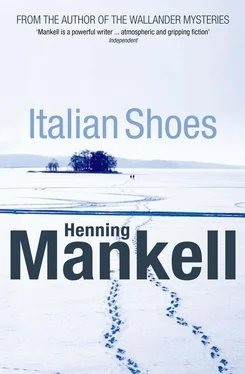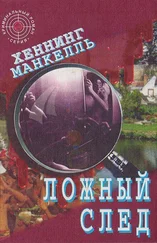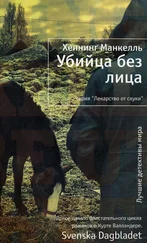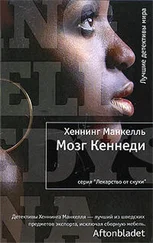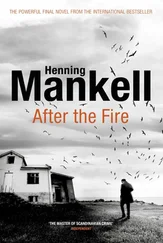Somewhere in Sweden there was a young woman who had lost an arm — the wrong arm amputated by me. She was twenty years old when it happened, so now she would be thirty-two. I could remember her name: Agnes Klarström. As I stood on the jetty, all the details came back to me — as if I had just reread her case notes. She came from one of the southern suburbs of Stockholm, Aspudden or Bagarmossen. It had all started as a pain in her shoulder. She was an outstanding swimmer and took part in competitions. For a long time she and her trainer assumed it was due to overexertion, but when it came to the point that she could no longer enter a pool without severe shoulder pains, she went to a doctor for a thorough examination. Then everything happened very quickly: a malignant bone tumour was confirmed, and amputation was the only possibility, despite the fact that it would be catastrophic for her swimming ambitions. Having been a swimming champion, she would be one-armed for the rest of her life.
I wasn’t even down for the operation — she was the patient of one of my colleagues. But his wife was involved in a serious car crash, and his operations list was farmed out somewhat haphazardly among the other orthopaedic surgeons. Agnes Klarström was assigned to me.
The operation took longer than an hour. I can still recall all the details, how the theatre nurses washed and prepared the wrong arm. It was my responsibility to check that the correct arm would be operated on, but I relied on my staff.
That was twelve years ago now. I had ruined Agnes Klarström’s life, and also my own. And what made matters even worse was that a subsequent examination of the arm with the tumour indicated that amputation had not been necessary.
It had never occurred to me that I would one day go to visit her. The only time I had ever spoken to her was immediately after the operation when she was still groggy.
It was two in the morning by now. I went back to the house and sat down at my kitchen table. I still hadn’t opened the door of my ant room. Perhaps I was afraid they would come teeming out if I did so.
I rang directory enquiries, but there was nobody in Stockholm of that name. I asked the operator, who said her name was Elin, to extend the search to the whole of Sweden.
There was one Agnes Klarström who could be the one I was looking for. She lived near Flen, some fifty miles west of Stockholm: the address suggested a farm in a village called Sångledsbyn. I made a note of the address and her telephone number.
The dog was asleep. The cat was outside in the moonlight. I stood up and went to the room in which a half-finished mat was still stretched over the frame of my grandmother’s loom. It had always been a significant image as far as I was concerned: this is what death always looks like when it rudely interrupts and terminates our lives. On a shelf where there had previously been reels of thread, I stored various papers I had been keeping for many years. A thin file containing documents, from my rather poor school-leaving report that my father was so proud of that he learned it off by heart, to the accursed copy of the notes of the amputation. The file was sparse because I have always had no difficulty in discarding papers that most people regard as important to keep. On top was the will that a ridiculously expensive lawyer had drawn up for me. Now I was forced to change it, because I had acquired a daughter. But that was not the reason I had come to the room with the loom that still smelled of my grandmother. I took out the operation notes from 9 March 1991. I spread the sheet of paper out on the table in front of me and read it from first to last.
Every word was like a sharp stone paving the path to my ruin. From the very first words: Diagnosis: chondrosarcoma of the proximal humerus sin , to the last one of all, Bandaging .
Bandaging . That was all. The operation was over, the patient was wheeled away to the recovery room. Minus an arm, but still with that confounded tumour in the bone of the other upper arm.
I read: Pre-op assessment. Twenty-year-old right-handed woman, previously basically healthy, examined in Stockholm due to swollen left upper arm. MRI scan shows low-grade chondrosarcoma left upper arm. Subsequent scan confirms diagnosis, patient agrees to amputation of proximal humerus which allows adequate margin. Operation: intubation narcosis, sunbed position, arm exposed. Usual antibiotic prophylaxis. Incision from coracoid process along lower edge of deltoid to the anterior fold of the axilla. Ligation of a cephalic vein and detachment of pectoralis. Identification of vascular structure, ligation of veins and securing of arteries with double ligatures. Extrusion of nerves from wound, and division. Then separation of deltoid muscle from humerus, and of latissimus dorsi and teres major. Separation of long and short head of biceps, also of coracobrachialis slightly below amputation level. Humerus sawn off at surgical neck and filed. Stump covered by triceps, which are separated, and by coracobrachialis. Pectoralis sewn to lateral edge of humerus using osteo-sutures. Drain inserted and skin flaps stitched together with no tension. Bandaging.
I supposed Agnes Klarström must have read this text many times, and had it explained to her. She must have noticed that among all the Latin terms, an everyday word suddenly cropped up: she had been operated on in a ‘sunbed position’. As if she had been lying on a beach or a veranda, with her arm exposed, and the operating theatre lights the last thing she saw before she lost consciousness. I had submitted her to an outrageous injustice while she was resting on a sunbed.
Could it possibly be a different Agnes Klarström? She had been young then — maybe she had married and acquired a new surname? Her entry in the telephone directory had evidently not indicated if she was Miss, or Mrs, or had any other title.
It was a scary but also a crucial night. I could no longer run away. I must speak to her, explain what was impossible to explain. And tell her that in so many ways I had also amputated myself.
I lay awake on top of the bed for a very long time before falling asleep. When I opened my eyes again, it was morning. Jansson would not be delivering any post today. I would be able to cut my way into my hole in the ice without interruption.
I had to use a crowbar in order to break through the thick ice. My dog sat on the jetty, watching my exertions. The cat had vanished into the boathouse looking for mice. I finally managed to create a big enough hole and stepped down into the burning cold. I thought about Harriet and Louise, and wondered if I would have enough courage today to ring Agnes Klarström and ask her if she was the woman I was looking for.
I didn’t ring that day. Instead, in a fit of frenzied activity, I gave the house a spring clean, as there was a thick layer of dust everywhere. I managed to start my ancient washing machine and washed my bedlinen, which was so filthy that it could easily have been a homeless tramp who’d been sleeping in my bed. Then I went for a walk round the island, surveyed the icy wastes with my binoculars, and accepted that I must make up my mind what to do next.
An old woman standing on the ice, a daughter I didn’t know I had in a caravan. At the age of sixty-six I was having to accept that everything I’d thought was definite and done with was starting to change.
After lunch I sat down at the kitchen table and wrote two letters. One was to Harriet and Louise, and the other to Agnes Klarström. Jansson would be surprised when I handed over two letters. To be on the safe side, I secured them with Sellotape. I wouldn’t put it past him to try to read all my correspondence.
What did I write? I told Harriet and Louise that my fury had passed. I understood them, but I wasn’t able to see them at the moment. I had returned to my island to look after my abandoned animals. But I took it for granted that we should meet again soon. Our conversations and our social intercourse must continue, obviously.
Читать дальше
